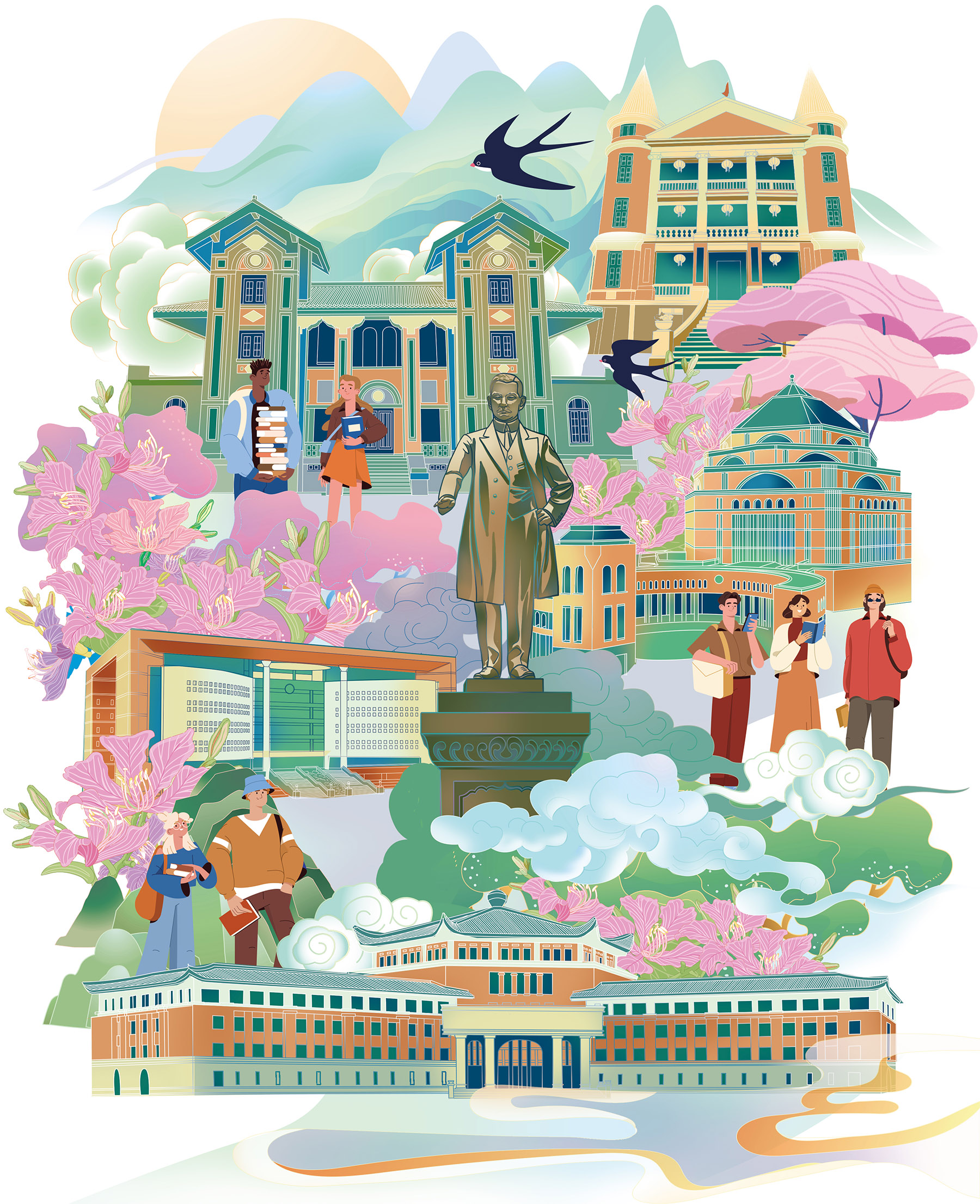Centennial Sun Yat-sen University has upheld its motto written by its founder in its development and continuously enriched the motto's meaning with progress through the eras.

Revolutionary pioneer Sun Yat-sen wrote the motto "Study Extensively, Inquire Accurately, Reflect Carefully, Discriminate Clearly, Practice Earnestly" when he established the National Guangdong University, the predecessor of Sun Yat-sen University, in Guangzhou, Guangdong province, a century ago.
Numerous masters in their respective fields put their weight behind the development of the university, including Feng Youlan, Guo Moruo, Lu Xun, Fu Sinian, Zhao Yuanren, Chen Yinke and Zhong Shifan.
Distinctive characteristics of being a comprehensive, research-oriented and open university have been fostered, with numerous talented people cultivated and important contributions made to the nation and its people, said university president Gao Song in a recent interview.
The university now has a full range of academic faculties including humanities, natural sciences, health sciences, engineering, agriculture and arts, with a strong capacity in basic research. The university accommodates 70 colleges and departments and 10 affiliated hospitals, with its postgraduate education encompassing all disciplines except military science.
READ MORE: International collaborations fuel growing influence
It operates 38 national-level platforms for scientific research and innovation and 243 such platforms at the provincial and ministerial levels. Emphasis is placed on the building of major science and technology infrastructure, including the Tianqin program on gravitational wave research, a comprehensive scientific research and student training ship, the research icebreaker, the National Supercomputer Center in Guangzhou, the high energy direct geometry chopper spectrometer and the center for precision medicine, Gao said.
The university's advantages also lie in its location within the Guangdong-Hong Kong-Macao Greater Bay Area, which shoulders the mission of becoming an international science, technology and innovation center. The university has five campuses in the major cities of Guangzhou, Zhuhai and Shenzhen in Guangdong, and launched the Sun Yat-sen University Institute of Advanced Studies Hong Kong in October. The university distinguishes itself with its unique culture cultivated through the founder's thoughts on education, the Lingnan culture in South China that features openness and inclusiveness, and its geographical location, he said.
Sun Yat-sen University ranks 73rd globally, gauged by Essential Science Indicators, a widely recognized tool for assessing the global academic standing and influence, or fifth among universities on the Chinese mainland.
Twenty-one of its academic disciplines are ranked among the top 1 percent of ESI, 11 of which among the top 0.1 percent.
Eyeing the future, Gao said the disciplinary improvement of the university will be based on demand arising from the development of science and technology and national strategy.
Such improvement will be aimed at cultivating several "peak disciplines" with stronger resource input to facilitate more major breakthroughs and to increase their global competitiveness.
Efforts will also be made to nurture new growth areas, ushering in the future and improving the cross-disciplinary building mechanism, an example of the latter being the establishment of the Institute of Green Chemistry and Molecular Engineering in 2023.
New engineering disciplines will be a growth area of the university, which will be located mainly on the campus in Shenzhen, which is witnessing dynamic development of strategic emerging industries. For that purpose, the university will continue to enhance cooperation with national research institutions and leading technology companies.
The university has forged strategic cooperation with institutions including Guangzhou Laboratory, Pengcheng Laboratory and Shenzhen Bay Laboratory to train postgraduate students.
It has also built joint research platforms with companies such as China Unicom, Sinopec, Guangzhou Automobile Group and Huawei Technologies.
To promote the progress of interdisciplinarity, the university carried out reform in recent years, leading to seven faculties and a three-tier (school-faculty-university) academic governing system.
With the establishment of the faculty of medicine in 2022, resources related to medical science have been consolidated and optimized, said Tian Guobao, vice-dean of the School of Medicine of the university, who has been devoted to the study of antimicrobial resistance.
The integration of related disciplines has since been promoted, he said, adding a team was formed in 2022 for the study of antimicrobial resistance of pathogenic microorganism, aiming for new breakthroughs.
In serving the national strategy, the university has made an array of achievements in basic research, including the discovery of nickelate high-temperature superconducting material and a new therapy for treating nasopharyngeal carcinoma.
The university has also made major achievements in the fields of philosophy and social sciences in serving State governance. The Institute of Guangdong, Hong Kong and Macao Development Studies, which is one of the first group of national high-end think tanks, has scored influential research results jointly with some other think tanks at the university.
Zhang Zhuoyuan, a 91-year-old alumnus of the university and an influential economist who has made significant contributions to market economy research, was awarded the national honorary title of Outstanding Contributor to Economic Research in September ahead of the 75th anniversary of the founding of the People's Republic of China.
ALSO READ: Guangdong medical experts treat patients in Xinjiang
The university has contributed to national strategies including Healthy China, rural vitalization, the development of the western region, the Belt and Road Initiative and advanced manufacturing.
On the education of students, Gao said the university has been putting into practice the philosophy of solidifying the foundation, promoting cross-discipline studies, respecting choices and excelling in teaching in recent years.
Students should develop in an all-around manner, be future-oriented and hold first-class creativity, which calls for an integration of general education and professional education, as well as a diversified and open system that can be constantly upgraded.
Amid a new round of technological and industrial revolution, innovation in talent cultivation is necessary, with focuses to be placed on nurturing top-end innovative talents, exploring new education catering to entrepreneurial endeavors and innovation, and empowering education with artificial intelligence, Gao said.


